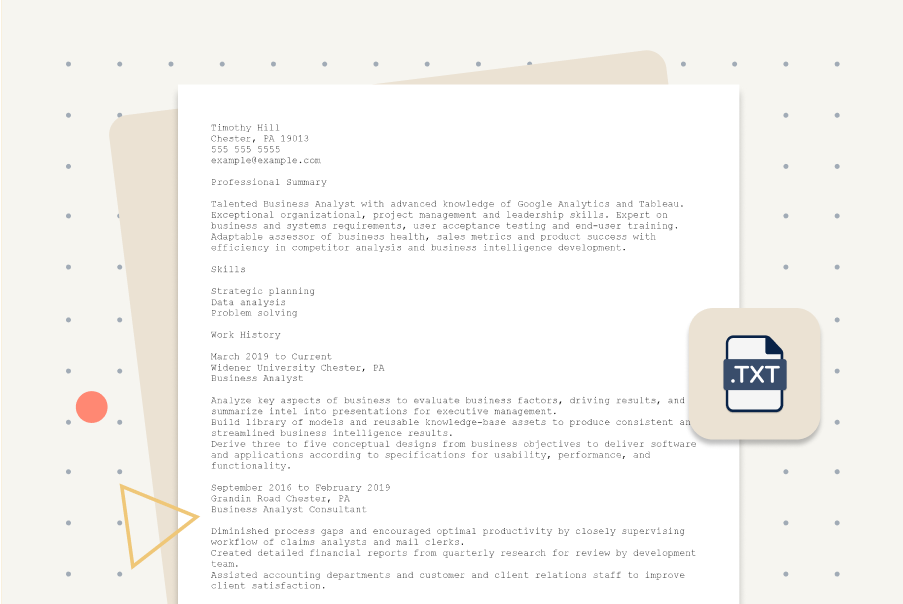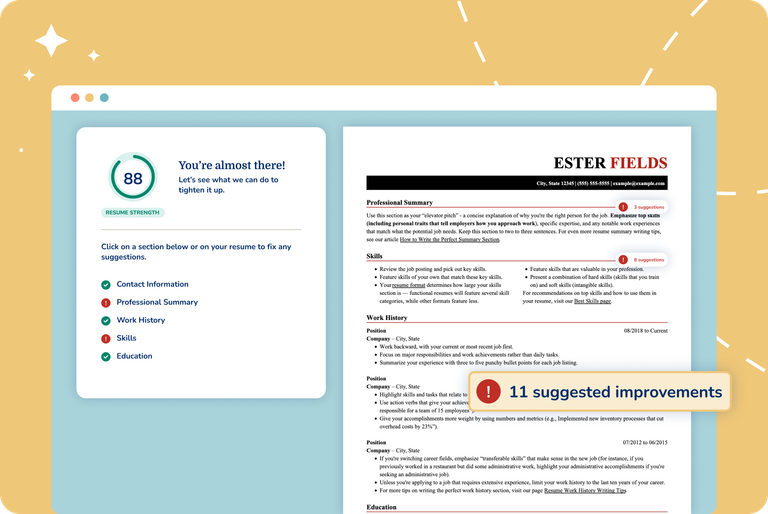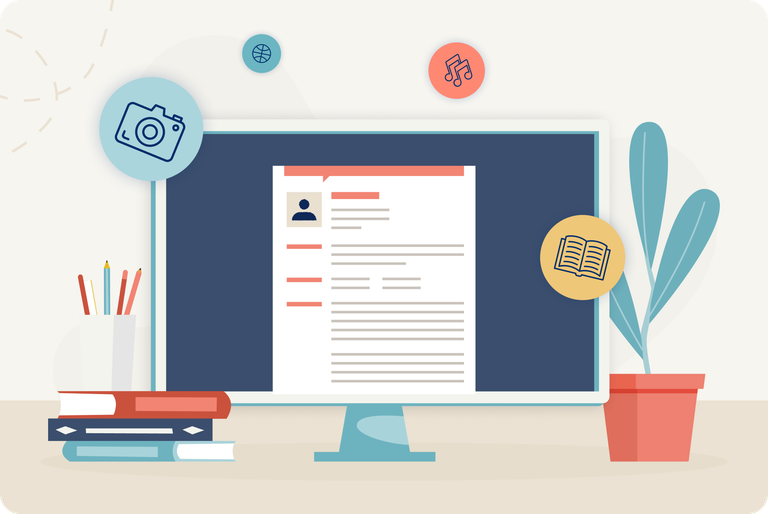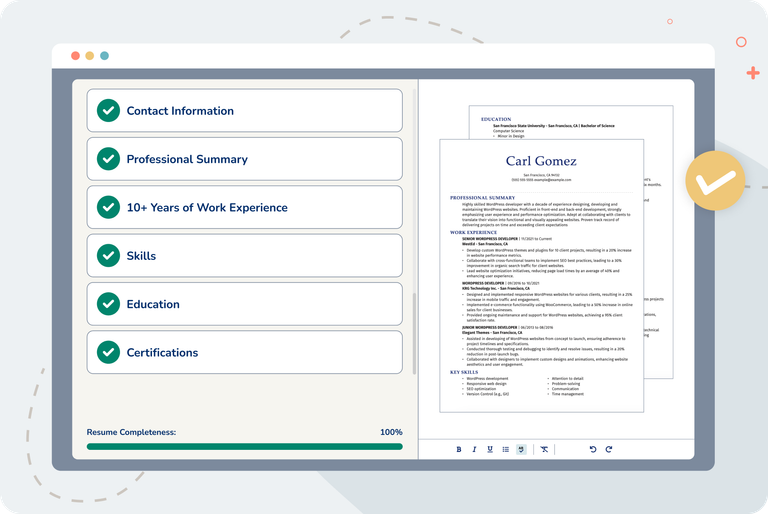Editors’ Picks
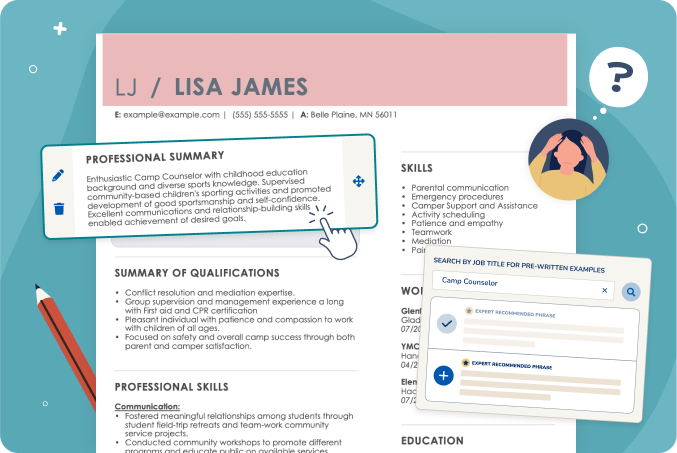
How To Write a Resume: A Complete Guide
You need a resume, and you need it fast. But with only seconds to make a strong first impression on hiring managers, how can you ensure your resume stands out? In
How to Fix & Update Your Resume in 2025
Your resume is one of the most important tools in your job search. It’s your chance to make a great first impression on potential employers and show them why you’re
How to Write a Cover Letter: Examples for Popular Jobs
A good cover letter is crucial to making a strong first impression and standing out from the competition. It’s a chance to present yourself in more detail and showcase your
AI Resume Skills Generator
Take the guesswork out of building your skills section with our AI resume skills generator. Our latest technology instantly creates a list of skills tailored to your desired role. If you
Most Recent

Networking Nation: 54% of Workers Got Hired Through a Connection
In today’s world of job boards, algorithms, and AI-driven applications, one old-school strategy still reigns supreme: human connection. More than half of workers say they’ve landed a job through a personal
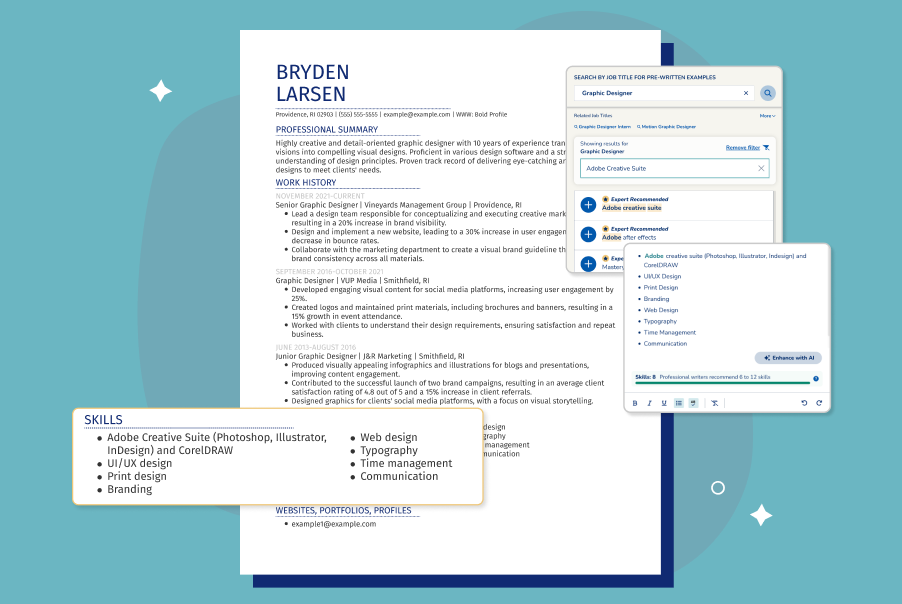
Computer Skills for Your Resume (and How to List Them)
Having computer skills in the current job market is a given. In fact, 92% of jobs require digital skills, making them essential to any work environment. But it’s not just about

How to Prepare for a Job Fair: Checklist & Resume Guide
Attending a job fair can be a powerful step forward in your job search. Whether you’re just starting your career or exploring new opportunities, job fairs offer the chance to
Resumes
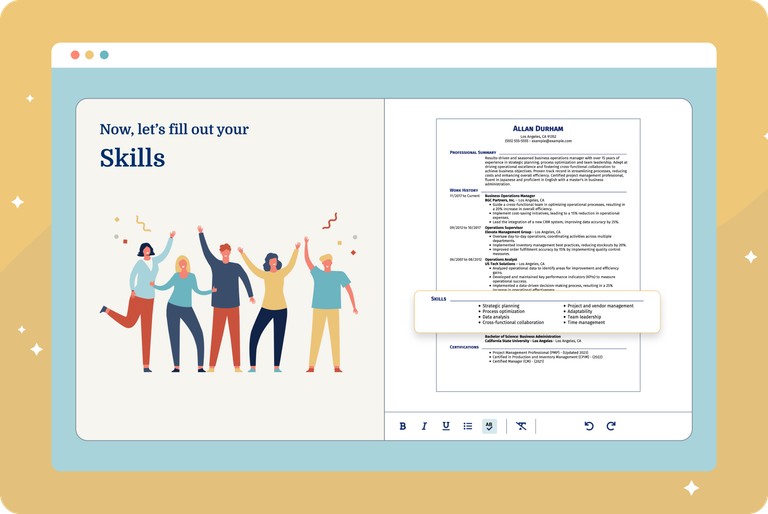
Essential Resume Skills: Examples for Any Job
You have the skills necessary for landing your next job, but it’s important to effectively showcase them in order to get notice and land that interview first. A winning resume
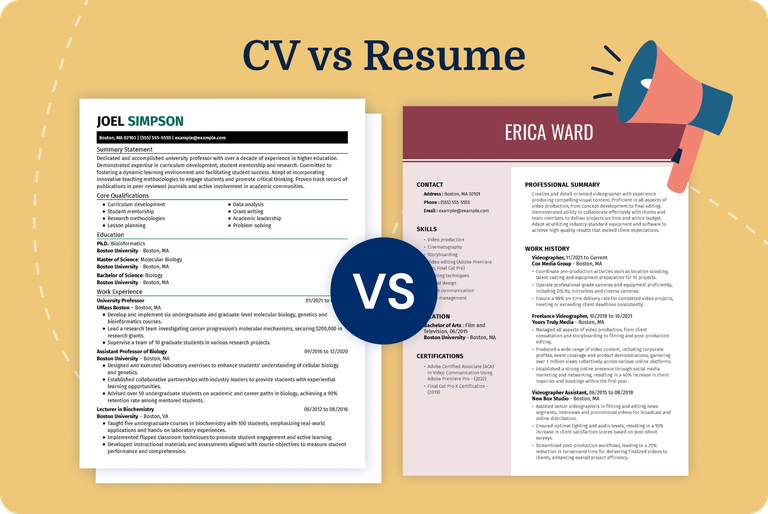
CV vs Resume: What’s The Difference?
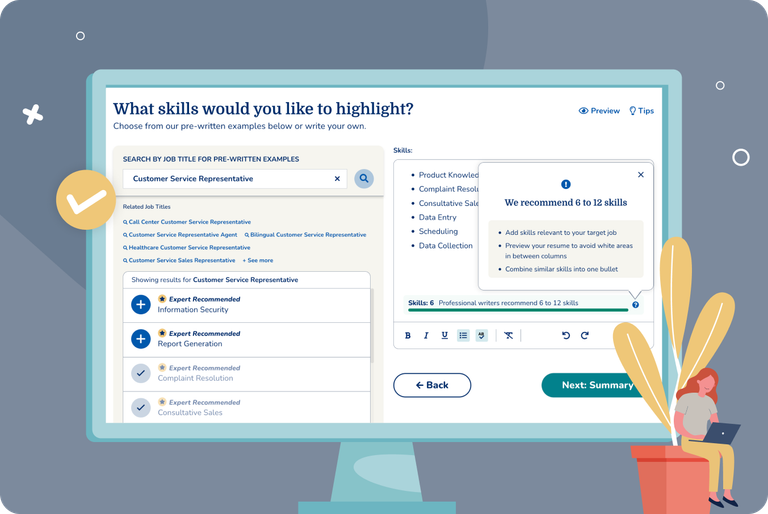
10 Best AI Resume Builders (Tested & Reviewed)
Get noticed with a polished cover letter
Use our cover letter examples as inspiration to write a perfect cover letter. Our Cover Letter Builder will guide you through each section of your cover letter and provide expert phrases you can include in just a few clicks.
Cover Letters

How to End a Cover Letter (Examples & Tips)
The final paragraph of your cover letter is more than just a formality — it’s a chance to reiterate your enthusiasm for the role and encourage the hiring manager to

Cover Letter Introduction: Examples & Writing Guide
A well-crafted cover letter introduction is essential for grabbing the hiring manager’s attention and setting the stage for your job application. Sounds like a mighty job for a few sentences! In

How to Start a Cover Letter: Expert Strategies to Stand Out
The opening lines of your cover letter are crucial for capturing the hiring manager’s attention and setting the tone for the rest of your application. In this guide, we’ll offer creative
Interviews
Cashier Interview Questions and Answers
Securing a cashier interview means your resume and cover letter stood out in the customer service industry. Now, impress the hiring manager with your skills. Face-to-face interviews are crucial in
How to Use the PAR Method: Complete Guide (With Examples)
Acing a job interview is about providing thoughtful and concise answers showcasing precisely what makes you the right candidate for the role. How can you ensure your answers hit the
Frequently Asked Dental Assistant Interview Questions & Answers
When interviewing for a dental assistant role, it’s essential to prepare for questions that assess both your technical knowledge and your ability to provide excellent patient care. In this guide, we’ll
HR Administrative Assistant Interview Questions & Answers
Job interviews can be stressful, even for an experienced HR administrative assistant. How you tackle each answer shows an employer what type of candidate you are. We can help you create
Frequently Asked Communications Specialist Interview Questions & Answers
Preparing for a job interview for a corporate communication specialist position is crucial. With the right planning, you can ace the interview and land the job of your dreams. Preparation means
Answers: What Does Good Customer Service Mean to You?
If you are applying for a customer service position, you will likely be asked, “What does good customer service mean to you” during your job interview.In this guide, we’ll offer
Build the perfect resume for the job you want.
Our free-to-use resume builder will help you easily create the perfect resume. We provide step-by-step writing advice and a resume check to fix common grammar and spelling mistakes.
Jobs
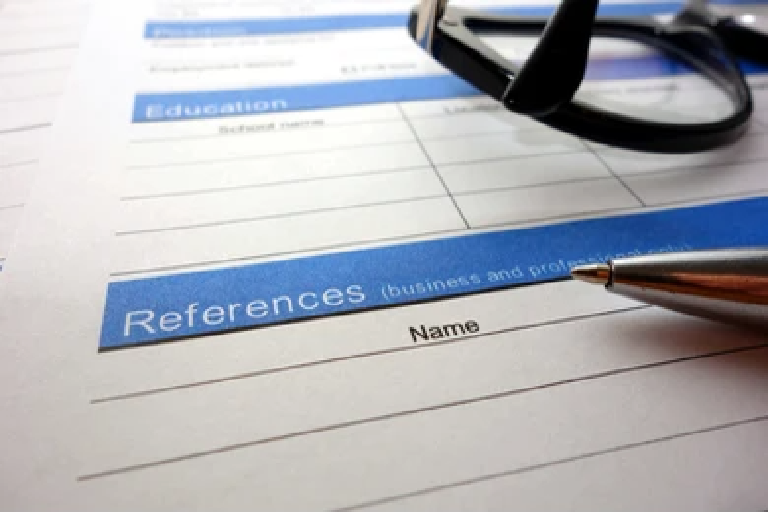
How To List References on a Resume (Examples & Key Considerations)
If you’re working on your resume, you might be wondering whether to include references. The short answer? Avoid listing references directly on your resume. Most employers don’t expect to see references

How to Follow Up on a Job Application (Templates & Guide)
In a competitive hiring climate, following up on a job application can set you apart from other candidates and improve your chances of securing an interview. In this guide, we’ll cover

How to Convert Your Federal Resume for the Private Sector
The ongoing wave of federal layoffs has left many government employees facing a time-sensitive need to transition into private-sector roles. One of the key adjustments in this transition is adapting a
Careers

11 High-Paying Careers You Can Upskill Into—No Grad School Required
You don’t need a master’s degree—or even years of experience—to land a six-figure job. With inflation, layoffs, and automation transforming the job landscape, upskilling has become one of the most strategic
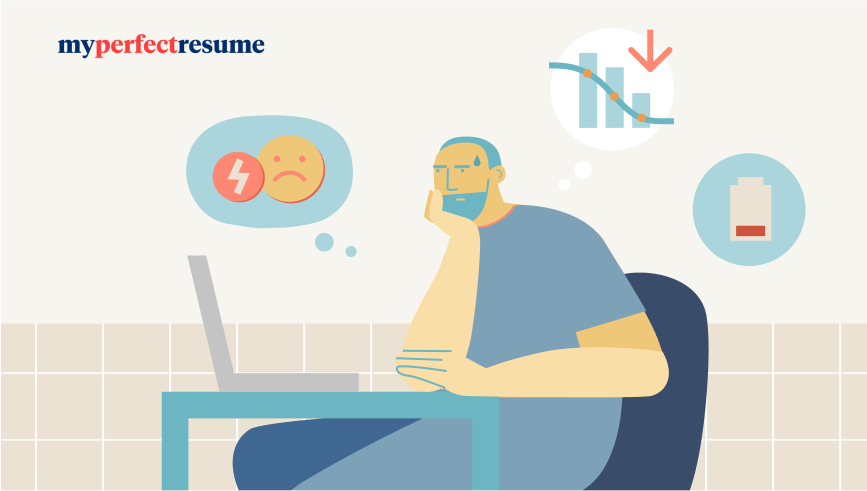
Workers on Edge: 80% Fear Wage Loss, 71% Expect Trade Fallout, 42% Anticipate Layoffs
A new national survey from MyPerfectResume reveals that American workers are bracing for economic turbulence. From inflation and stagnant wages to trade tensions and layoffs, employees are increasingly anxious—and making
Top Resume and CV Examples
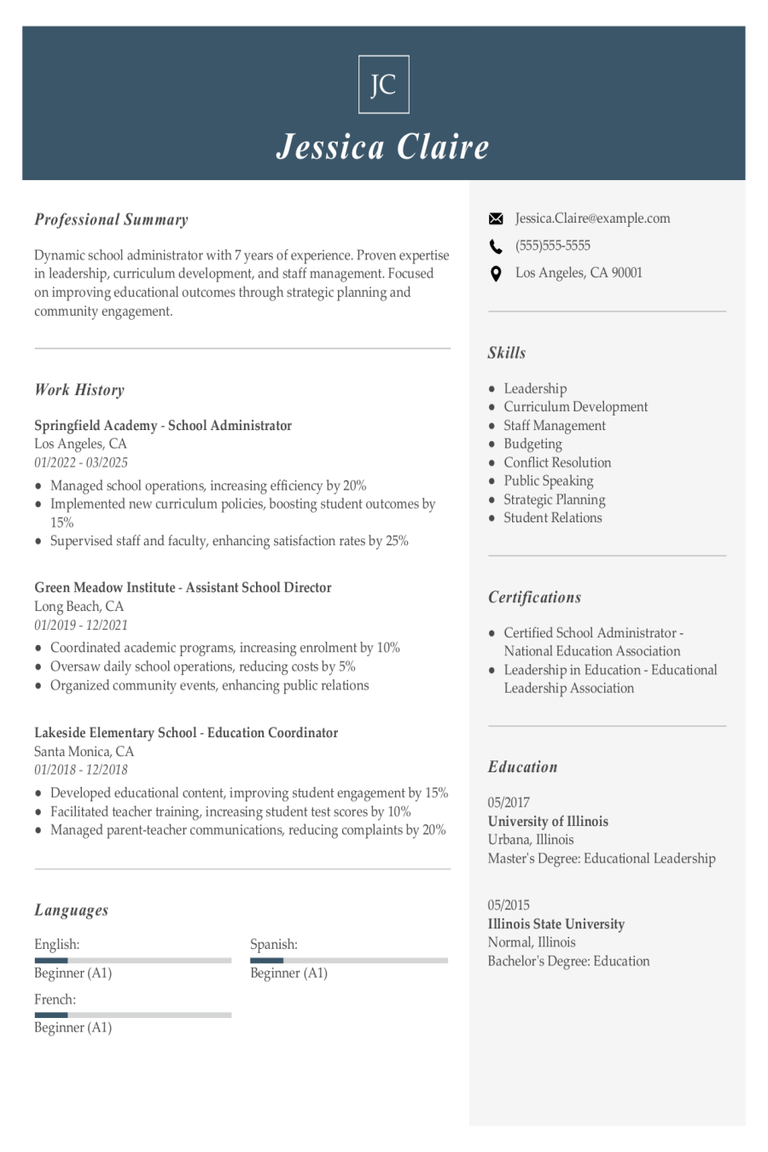
School Administrator Resume Examples & Templates
Explore school administrator resume examples to learn how to highlight your leadership skills and experience with staff supervision and school operations.Build my resumeImport existing resumeCustomize this templateWhy this resume worksQuantifies

Dean of Students Resume Examples & Templates for 2025
Explore dean of students resume examples to see how to showcase your experience leading student services, resolving conflicts, and fostering a positive school environment.Build my resumeImport existing resumeCustomize this

School Superintendent Resume Examples & Templates for 2025
Explore superintendent resume examples that demonstrate strong educational leadership skills and effective management of district-wide operations. Use these tips to highlight your experience driving school improvement and advancing student achievement.Build

Special Education Teacher Cover Letter Examples & Templates
Special education teachers are compassionate and highly trained professionals who help students with physical, emotional or developmental needs thrive in a school environment. A strong special education teacher cover letter

Sales Executive Cover Letter Example & Templates
Start by editing this sample cover letter for a sales executive or explore our 250+ cover letter examples to find the best match for you.
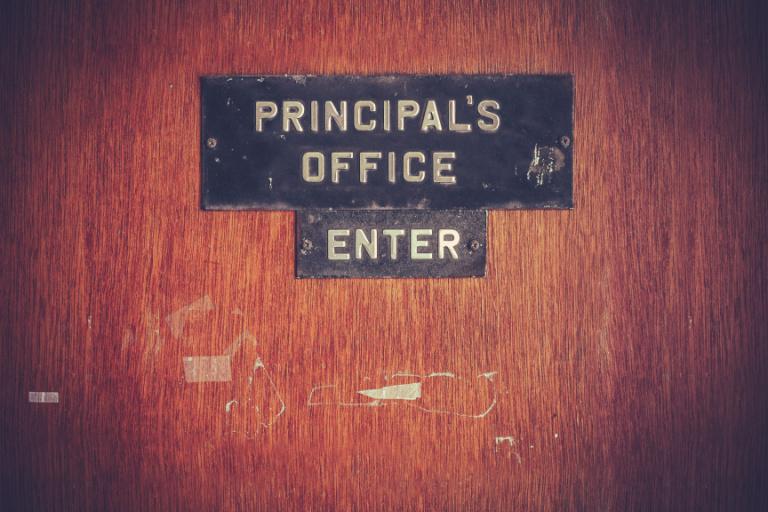
Principal Cover Letter Example & Templates
As shown in the free principal cover letter sample, a cover letter should be three or four paragraphs that convince the hiring manager to contact you for an interview. The

Library Assistant Cover Letter Example & Templates
Start by editing this library assistant cover example, or explore our collection of more than 250 cover letter examples to find the best match for you.

Graduate Assistant Cover Letter Example & Templates
Start by editing this graduate assistant cover example, or explore our collection of more than 250 cover letter examples to find the best match for you.

Executive Director Cover Letter Example & Templates
When you write your version of this free executive director cover letter sample, there are some important things to keep in mind. First, keep it short and to the point.

Case Manager Cover Letter Example & Templates
The strength or weakness of your cover letter may determine whether or not you are considered for a job position. In order to receive an interview, it can be important
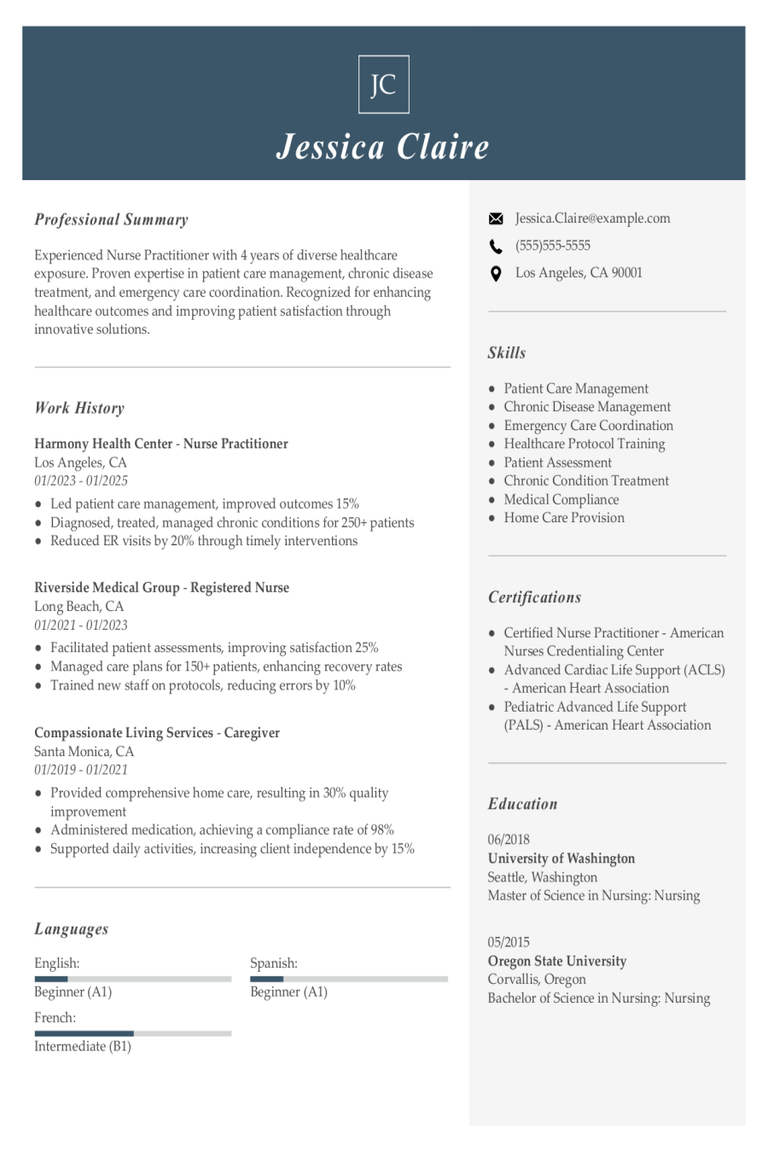
Nurse Practitioner Resume Examples & Templates
Explore nurse practitioner resume examples that showcase how to highlight your clinical experience, advanced nursing skills, and patient care expertise.Build my resumeImport existing resumeCustomize this templateWhy this resume worksQuantifies accomplishments: Includes

Engineer Resume Examples & Templates
There are many types of engineering careers, and they all have one thing in common: building and creating things, from bridges and dams to machines, textiles and prosthetic limbs. The

Medical Doctor Resume Examples & Templates
Entry-level
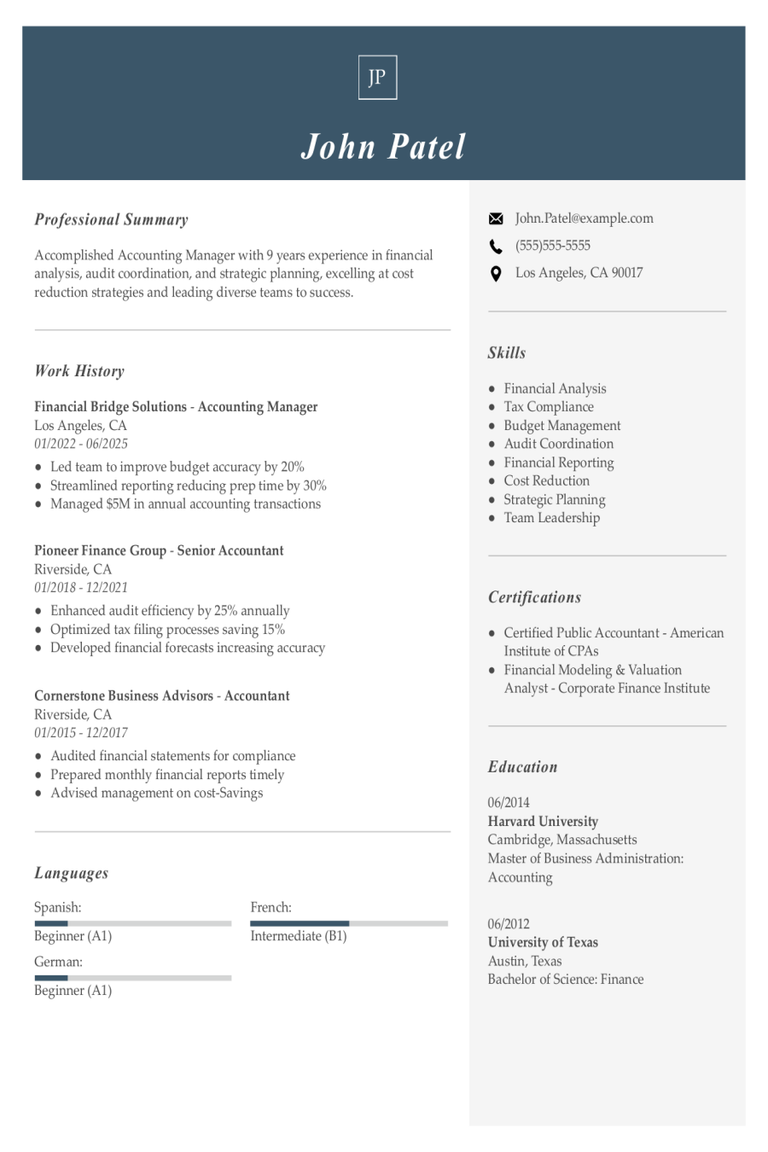
Accounting Manager Resume Examples & Templates for 2025
Explore accounting manager resume examples and tips that can help you highlight your budgeting skills and experience in managing financial reports effectively.Build my resumeImport existing resumeCustomize this templateWhy this resume
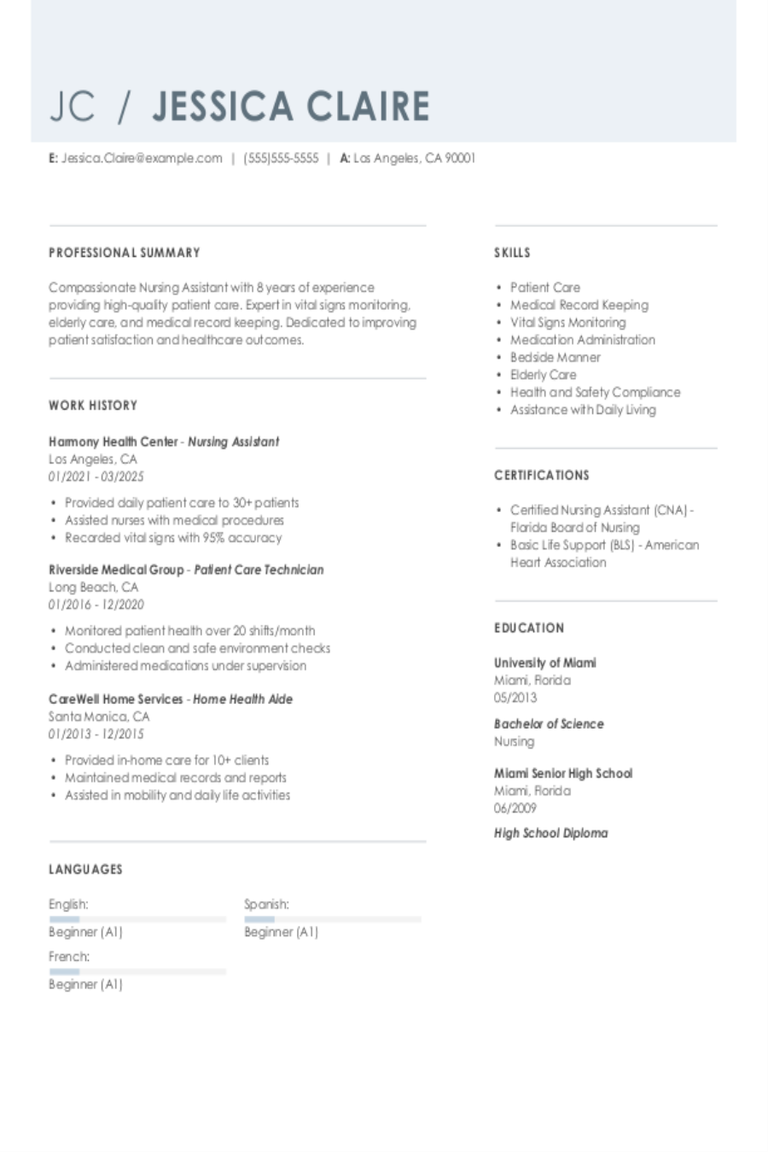
Best Nursing Assistant Resume Examples + Guide & Pro Tips
Explore nursing assistant resume examples and writing tips to learn how to highlight your hands-on experience and patient care skills effectively.Build my resumeImport existing resumeCustomize this templateWhy this resume worksHighlights

Operating Room Registered Nurse & Templates
An operating room registered nurse is one of those professions that is easy to identify thanks to its constant portrayal in movies and television shows. But there is a great

Administrative Assistant Cover Letter Examples & Templates
Administrative assistants are indispensable for the success of any organization. Whether handling documents, managing schedules, answering phones and emails or interacting with clients, their support is invaluable. When paired with

Executive Assistant Cover Letter Examples & Templates
Start by editing this sample cover letter for an executive assistant or explore our cover letter templates to find the best match for you.

Data Entry Specialist Cover Letter Examples & Templates
Start by editing this cover letter sample for a data entry specialist or explore our cover letter templates to find the best match for you.

Director Cover Letter Example & Templates
Directors lead companies and advance businesses to the next level. They are the bosses–the ones who make the important decisions. They must be able to complete the following tasks:Assigning tasks Assessing

Bartender Cover Letter Example & Templates
A well-written bartender cover letter can help you differentiate yourself from the competition. Along with a well-written resume, highlighting your exceptional interpersonal skills and problem-solving skills will give you an
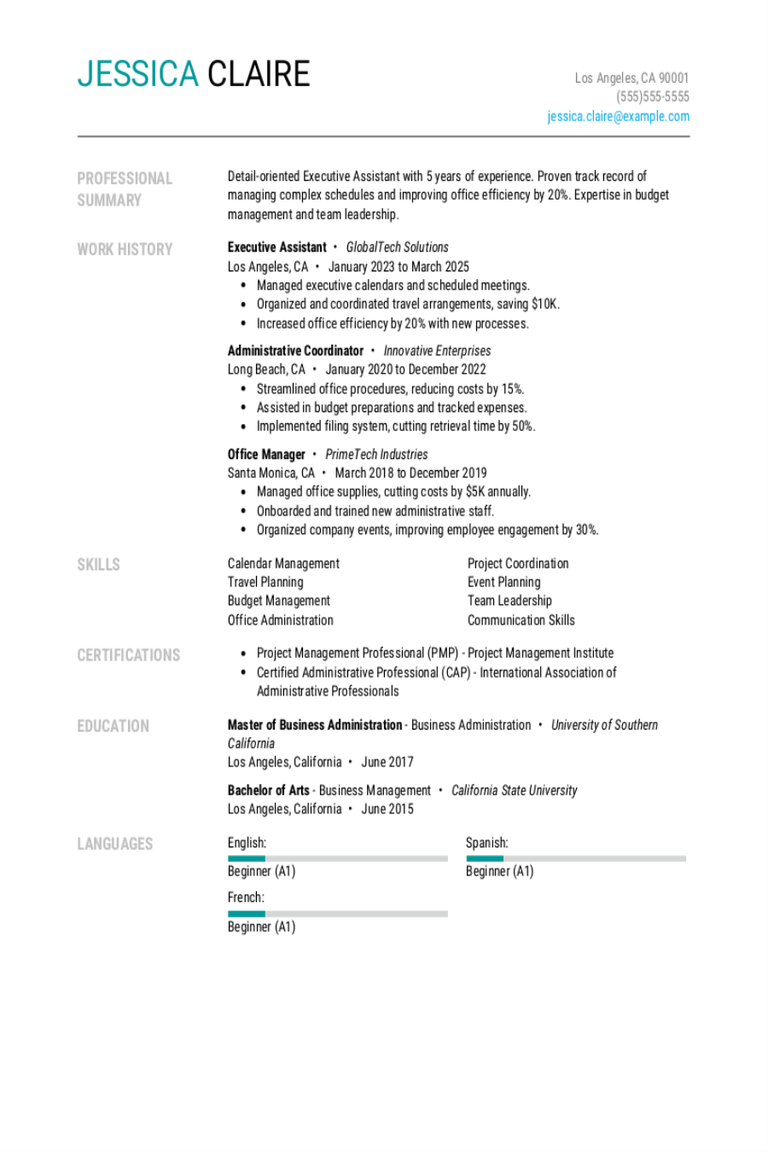
Executive Assistant Resume Examples & Templates
Browse executive assistant resume examples to see how to showcase strengths like managing schedules and coordinating meetings. Get expert writing tips to create a resume that reflects your experience and
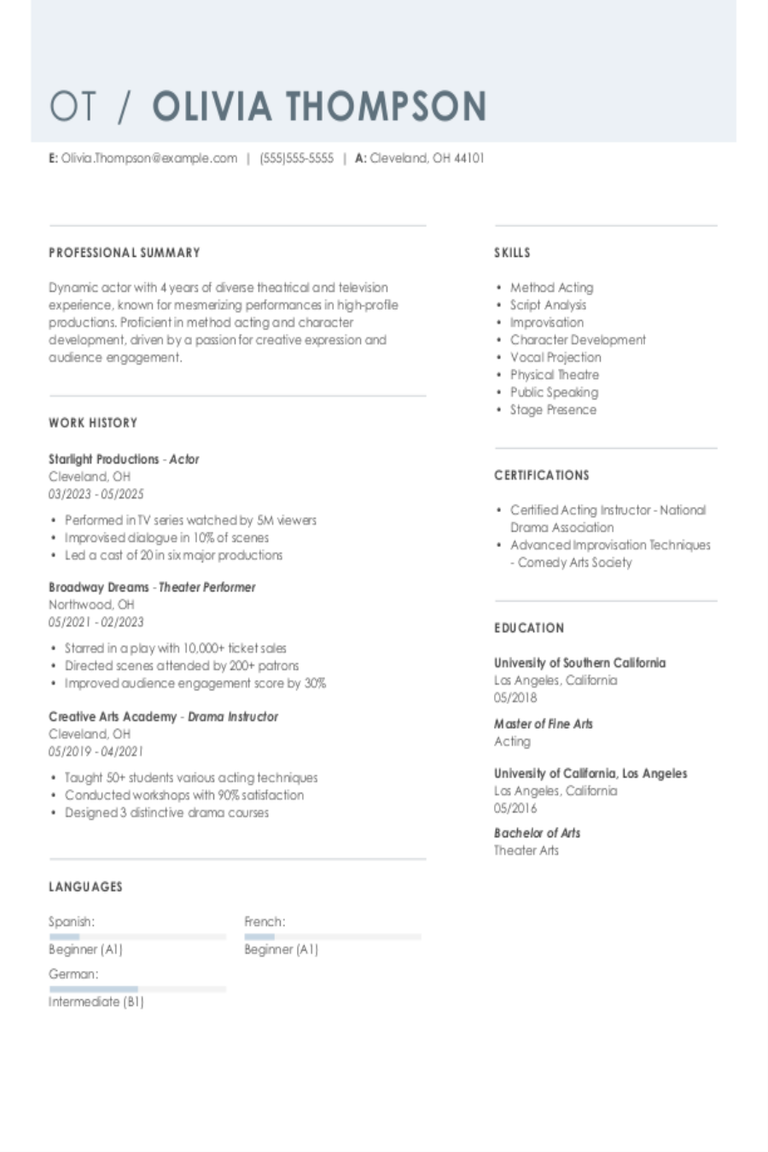
Actor Resume: Example & Tips
Discover acting resume examples that help you share your talents and experience. We’ll show you how to showcase your roles, skills, and training in a way that catches attention and
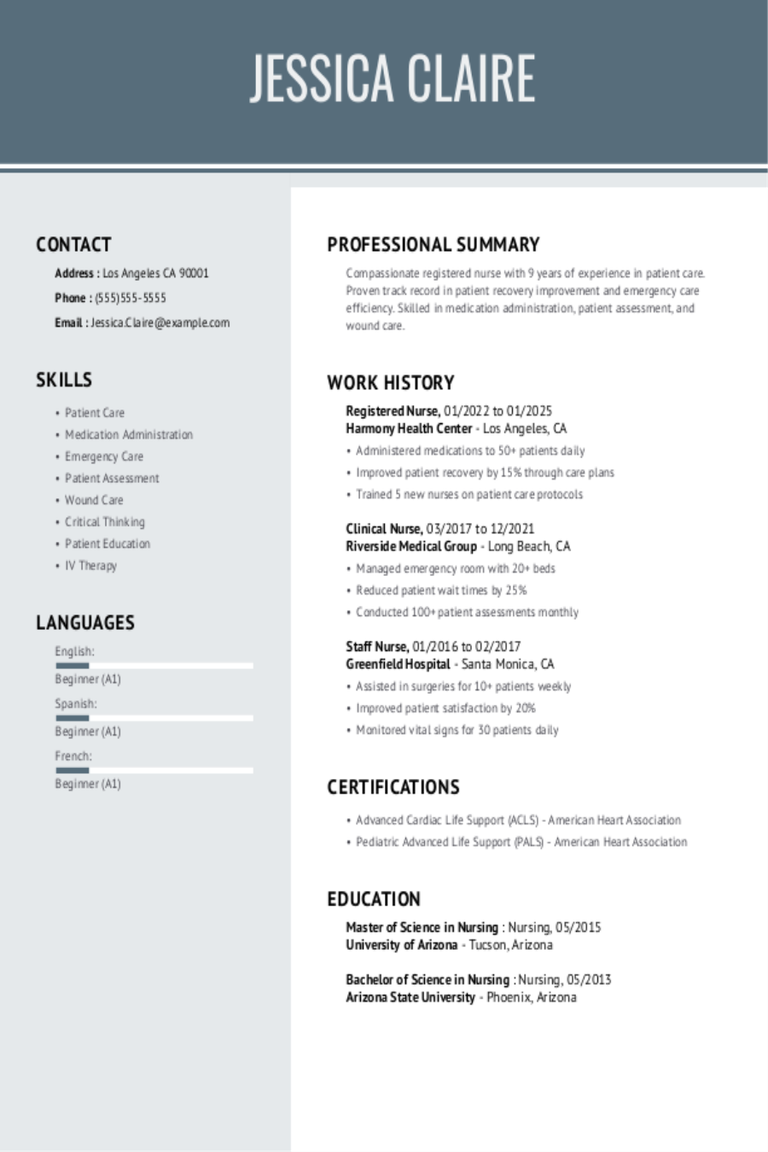
Registered Nurse Resume Examples & Templates
Explore top registered nurse resume examples that showcase your essential clinical skills. Learn how to effectively present your patient care experience and medical expertise to impress healthcare employers.Build my resumeImport

Nursing Aide Resume Examples & Templates
You need a great resume if you want a job as a nursing aide, so we’re here to help you build one. Our guide to crafting an effective resume for

Customer Service Representative Resume Examples & Templates for 2025
Browse customer service representative resume examples and tips to help you highlight your communication strengths and experience in handling customer inquiries effectively.Build my resumeImport existing resumeCustomize this templateWhy this resume
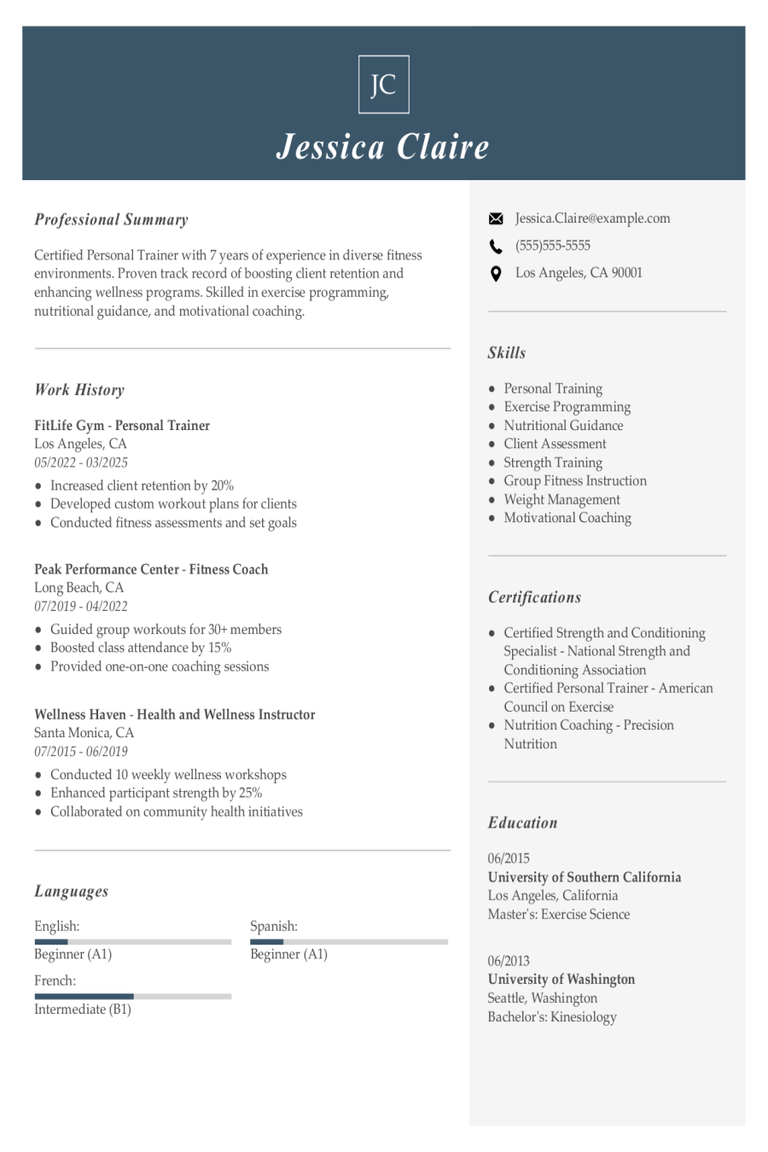
Personal Trainer Resume Examples & Templates
See how a strong personal trainer resume highlights your fitness expertise. These examples will help you showcase key skills like client programming, coaching, and motivation to stand out.Build my resumeImport
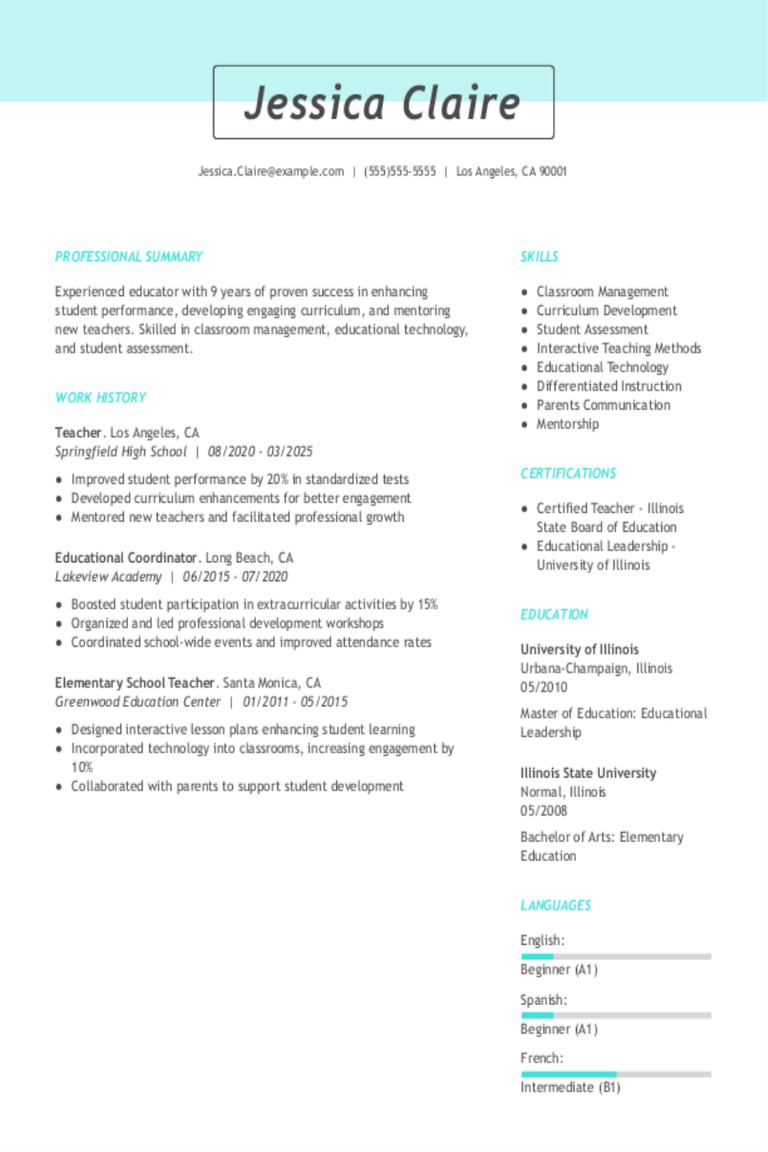
Teacher Resume Examples & Templates
Explore a variety of teacher resume examples that demonstrate how to organize your resume, highlight essential teaching skills, and showcase your classroom experience.Build my resumeImport existing resumeCustomize this templateWhy this

Information Technology Resume Examples & Templates
Information technology (IT) professionals perform a wide range of tasks related to managing and maintaining computer systems, networks and software. Get expert tips on how to write a resume that

Best Law Enforcement Resume Examples & Templates
Your community connections, law knowledge and commitment to protection can help you pursue a career in law enforcement. Time to write a resume to stand out from the applicant pool. We’re

Retail Resume Examples & Templates for 2025
Looking to create a standout retail resume? Check out these samples and tips to learn how to showcase your customer service skills and sales experience in a way that grabs
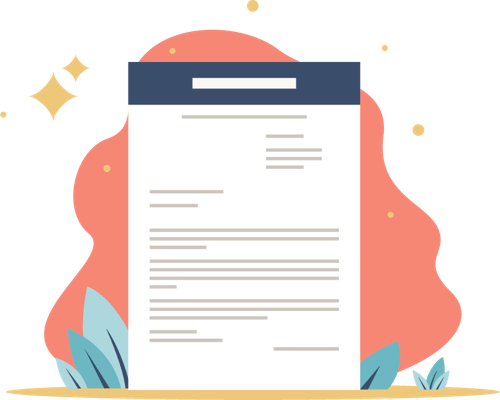
Healthcare Support Cover Letter Examples & Templates
Healthcare support provides assistance to doctors and nurses while providing emotional support to patients and their families. Your role is as much technical as it is interpersonal. An efficient healthcare
